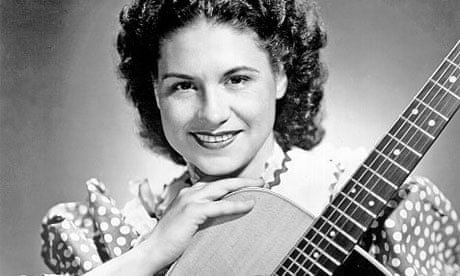Kitty Wells, who has died aged 92, made a place for the female country singer in the postwar era, opening doors through which would follow Loretta Lynn, Tammy Wynette, Dolly Parton and many other women determined to match their male counterparts all the way. Piercing and penetrating, Wells's was the quintessential country voice of desolation and atonement.
There had been female singers in country music before – the indefatigably yodelling Patsy Montana; Molly O'Day, all gingham and tears; the regal Sara Carter – but they always required the presence of male protectors: singing husbands or an all-male backing band. In the 1940s and 50s, with the rise of such charismatic performers as Hank Williams and Johnny Cash, country music came to seem more and more like men's business. Wells changed all that with a single song, It Wasn't God Who Made Honky Tonk Angels (1952).
The road to that hit had been a long one. Born Ellen Muriel Deason in Nashville, Tennessee, she left school in her teens, in the Depression-hit early 30s, and took a job ironing shirts. She came from a musical family, had learned to sing and play guitar, and got some experience of performing on radio in a family quartet. In 1937 she married Johnnie Wright and sang with him and his sister. A couple of years later, Wright and Jack Anglin formed a duet act, Johnnie & Jack, and she toured with them in the then conventional role of the "girl singer". Up to that point she had been using her birth name, but Wright conferred on her the more resonant Kitty Wells, a name drawn from an old song.
After the second world war, Johnnie, Jack and Kitty secured a place in the cast of the Louisiana Hayride, which at that time was second only to the Grand Ole Opry as a shop window of country music talent. In 1952, after Johnnie & Jack's hit recording Poison Love, the Opry stage was theirs too.
Another hit country record of that year was Hank Thompson's The Wild Side of Life, a man's song about a woman who rejects friends and loved ones for a life in "the places where the wine and liquor flows". It was set to the melody of both a tender old country song of separated lovers, I'm Thinking Tonight of My Blue Eyes, and – even more incongruously – Roy Acuff's scriptural hit of the 30s, The Great Speckled Bird.
"Answer songs" had long been a staple of country music, and an enterprising songwriter in Louisiana, JD Miller, had the notion of redeploying the tune for a woman's riposte: it was not women's frailties, but uncaring men, that were responsible for the soiled doves of the backstreets – "From the start most every heart that's ever broken/ Was because there always was a man to blame." Wells's recording of this anthem to the honky tonk angel, although banned by the NBC network as suggestive, and for a time excluded too from the Opry, was a huge hit, ruling the country charts for weeks and reportedly selling more than three-quarters of a million discs.
Wells issued another communique from the dark side of town, Paying for That Back Street Affair; sang duets with Red Foley such as One By One and As Long As I Live; and had further hits with Making Believe, I Can't Stop Loving You, Mommy for a Day and Heartbreak USA – songs that skilfully evoked both the lure of sin and the comfort of repentance. "On Wells's records," wrote the country-music historian Mary Bufwack, "sorrowful men and women acted out their emotional dramas through her plaintive vocals accompanied by a crying steel guitar."
By the end of the 50s, Wells had had more than 30 top 10 records in the Billboard country charts, and was billed as the "Queen of Country Music". Decca so valued her that they signed her to a lifetime contract, though after Will Your Lawyer Talk to God (1962) she was less of a presence in the country charts. But this mattered little to the female fans whom she had gathered over the past decade: they turned up at her engagements, watched her syndicated TV programme and bought her book of favourite songs and recipes. Unlike some women in country music – and indeed unlike the heroines of many of her songs – she dressed conservatively and had a sober and scandal-free life.
She was elected to the Country Music Hall of Fame in 1976 and, at the Grammy ceremony in 1991, received a lifetime achievement award, the first woman in country music to be so honoured.
Wells's daughter Ruby died in 2009 and Wright died in 2011. She is survived by her younger daughter Sue, her son Bobby, eight grandchildren and 12 great-grandchildren.
